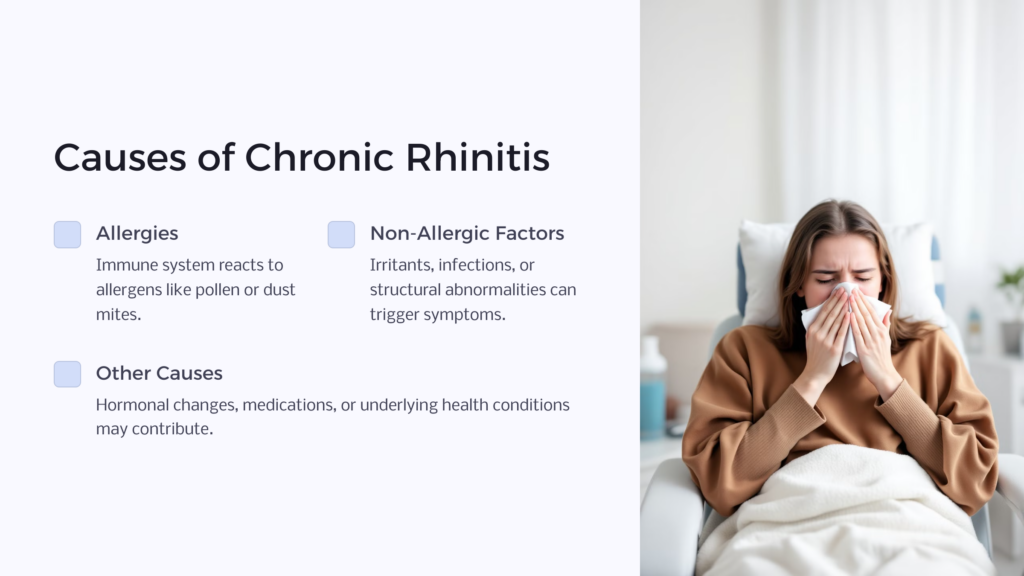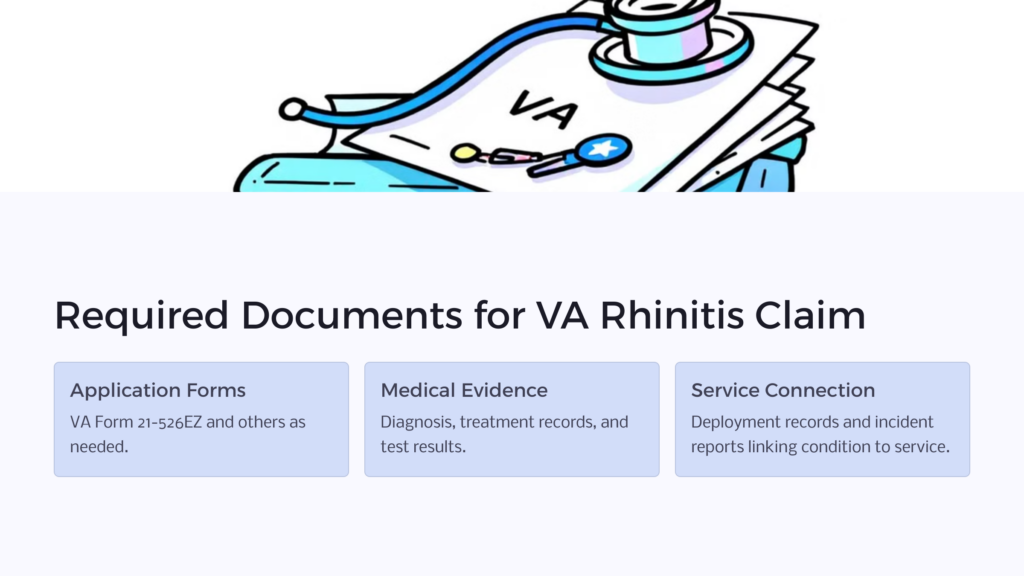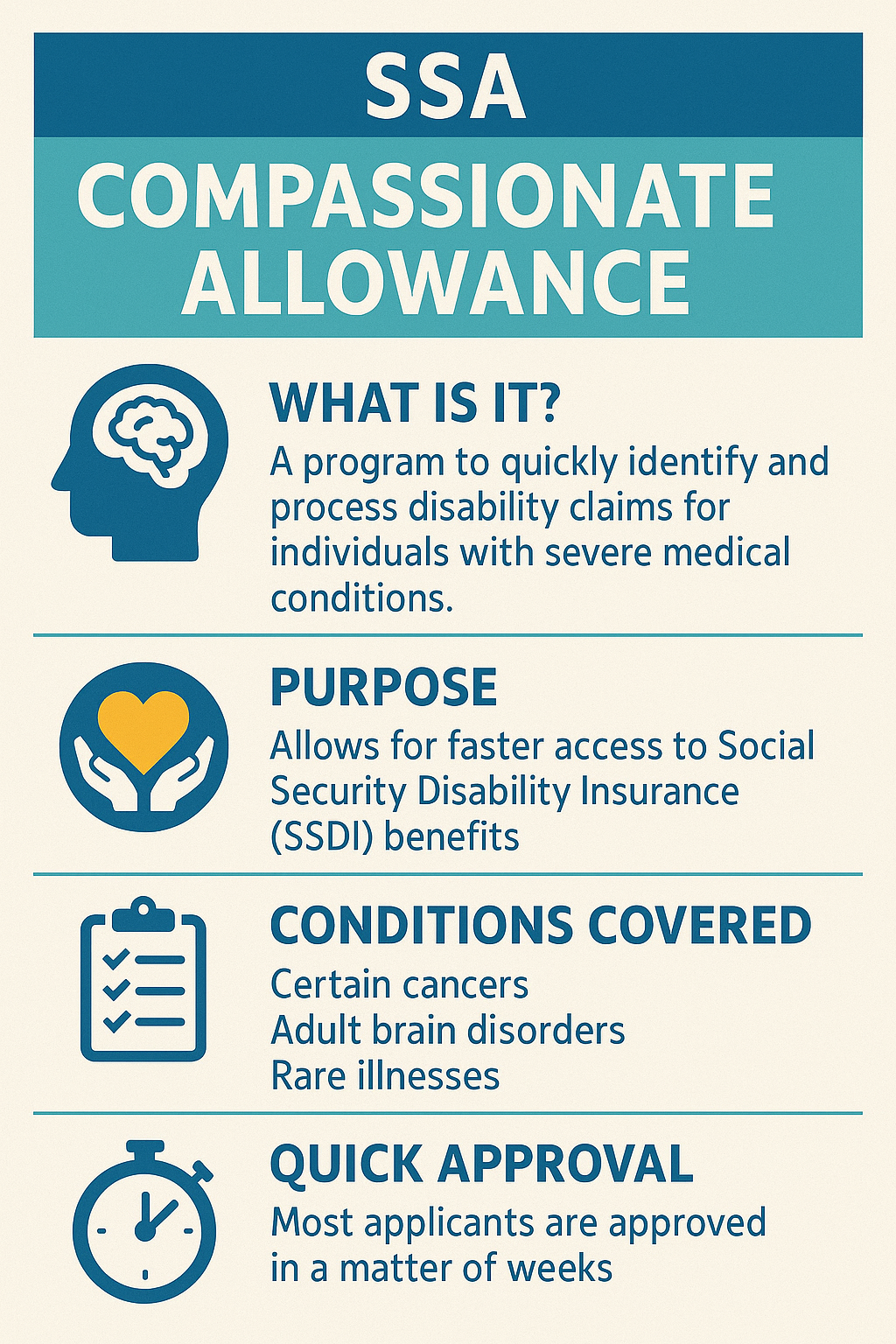Rhinitis refers to symptoms that occur when the nose becomes irritated or inflamed. These nasal symptoms include an itchy and runny nose, a blocked and congested nose, and sneezing. This could be accompanied by an itchy throat, eyes, and ears, and persistent ear infections.
What causes Chronic Rhinitis?

Chronic rhinitis is a condition characterized by persistent inflammation of the nasal lining. This could lead to symptoms including a runny or stuffy nose, sneezing, and postnasal drip. Here are a few potential causes and contributing factors for chronic rhinitis:
Allergies:
Chronic Allergic Rhinitis, commonly known as hay fever, is a major cause of chronic rhinitis. It occurs when the immune system reacts to allergens like pollen, dust mites, pet dander, or mold spores, triggering allergy symptoms such as inflammation in the nasal passage.
Non Allergic Rhinitis:
This type of rhinitis is not caused by allergies but can have similar symptoms. It can be triggered by irritants like smoke, strong odors, changes in temperature or humidity, and certain medications.
Infections:
Recurrent or persistent bacterial or viral infection of the upper respiratory tract can lead to chronic rhinitis. These infections can damage the nasal lining and cause ongoing inflammation.
Environmental Factors:
Exposure to environmental pollutants, such as air pollution, can contribute to chronic rhinitis by irritating the nasal passages and causing inflammation.
Structural Abnormalities:
Structural issues within the nose, such as a deviated septum or nasal polyps, can obstruct airflow and lead to chronic rhinitis symptoms.
Hormonal Changes:
Hormonal fluctuations, like those you experience during pregnancy or as a result of certain medical conditions, can contribute to nasal congestion and rhinitis symptoms.
Medications:
Certain medications (like the prolonged use of nasal decongestant sprays) can cause rebound congestion and lead to chronic rhinitis symptoms.
Gastroesophageal Reflux Disease:
Some people with gastroesophageal reflux disease (GERD) may experience symptoms of chronic rhinitis. This is because the disease causes stomach acid to flow back into the esophagus. The acid could reach (and damage) the throat and nasal passages.
Underlying Health Conditions:
Chronic rhinitis can be associated with other medical conditions such as asthma, chronic sinusitis, immune system disorders, or systemic diseases.
Chronic rhinitis can have multiple contributing factors, and an individual may have a combination of these causes.
What is the difference between chronic and allergic rhinitis?
Chronic rhinitis and allergic rhinitis are both conditions that affect the nose and result in symptoms like sneezing, runny or stuffy nose, and postnasal drip. However, they have distinct underlying causes.
Allergic rhinitis, commonly known as hay fever, is an allergic reaction to airborne particles such as pollen, dust mites, pet dander, or mold spores. It is triggered by the immune system’s response to these allergens, leading to inflammation of the nasal passages.
Allergic Rhinitis symptoms occur seasonally or during specific times of the year when a certain allergen is more prevalent. These symptoms include sneezing, itching, watery eyes, and a clear runny nose.
Allergic rhinitis can be diagnosed through allergy testing such as skin prick tests or blood tests to identify specific allergens.
Chronic rhinitis (a type of nonallergic rhinitis), on the other hand, refers to inflammation of the nasal passages that persists over a long period, regardless of allergen exposure.
It can be caused by various factors, including infections, irritants, hormonal changes, certain medications, structural abnormalities in the nasal passages, or other underlying medical conditions.
Chronic rhinitis symptoms can be similar to those of allergic rhinitis, including a runny or stuffy nose, postnasal drip, and sneezing. Unlike allergic rhinitis, chronic rhinitis may not be triggered primarily by allergens and may not have a clear seasonal pattern.
Diagnosis of chronic rhinitis involves evaluating medical history, physical examination, and sometimes imaging or other tests to identify underlying causes.

Both chronic rhinitis and allergic rhinitis could potentially be considered service-connected disabilities if they are linked to a veteran’s military service. To be eligible for VA benefits, a veteran needs to establish a connection between their current condition and their military service. This may involve providing medical evidence, including records of diagnosis, treatment, and any relevant medical opinions.
The specific benefits and compensation awarded for chronic or allergic rhinitis would depend on various factors, including the severity of the condition and its impact on the individual’s daily life and ability to work.
It’s important for veterans seeking VA benefits to consult with a VA representative or a knowledgeable legal/medical professional who can provide up-to-date information and guidance based on the current regulations and policies.
Is allergic and/or chronic rhinitis presumptive?
Presumptive conditions are conditions that are presumed or assumed to have been caused by exposure to certain substances. The PACT Act recently expanded the list of presumptive conditions that qualify for VA healthcare and benefits to individuals who were exposed to burn pits, Agent Orange, and other toxic substances during their service in Vietnam, the Gulf War, and post-9/11.
The PACT Act (short for Sergeant First Class (SFC) Heath Robinson Honoring our Promise to Address Comprehensive Toxins Act) includes chronic rhinitis (and chronic sinusitis) under its list of presumptive conditions. That means a veteran who served in active duty in the Gulf War or post-9/11 need not submit proof that the condition is connected to their service. This service connection is assumed based on the likelihood of experiencing burn pit exposure or other toxic exposure during your service. These environmental exposures could cause you to be eligible for VA disability benefits.
Find out more about the PACT Act and your VA benefits.
How do you prove chronic rhinitis?
If your disability claim is not covered under the PACT Act, you will need to prove that you have chronic rhinitis to submit a VA disability claim for chronic rhinitis.
To diagnose chronic rhinitis, a doctor will typically consider your medical history, perform a physical examination, and may recommend various tests or assessments. Here are some steps that might be involved in the diagnostic process:
Medical History:
When collecting your medical history, your doctor will ask you about your symptoms. They might ask how long they have been present, whether any triggers worsen the symptoms, and which treatments you may have tried.
Physical Examination:
A thorough examination of your nasal passages, throat, and possibly your ears might be conducted to assess the extent of inflammation and other potential issues.
Test for Allergies:
Allergies can often contribute to chronic rhinitis. Skin prick tests or blood tests (like the ImmunoCAP test) can help identify specific allergens that might be triggering your symptoms.
Nasal Endoscopy:
In some cases, a doctor may perform a nasal endoscopy. This involves inserting a thin, flexible tube with a camera into your nasal passages. This allows them to visually examine the inside of your nose and identify any structural abnormalities or signs of inflammation that might cause the symptoms.
Imaging Studies:
In some situations, imaging studies such as a sinus X-ray, CT scan, or MRI might be recommended to get a more detailed view of your nasal passages and sinuses.
Response to Treatment:
Chronic rhinitis could be proven if your symptoms respond well to specific treatments.
Exclusion of Other Conditions:
Your doctor might need to rule out other conditions with similar symptoms, such as sinus infections, nasal polyps, or other underlying medical issues before confirming a diagnosis of chronic rhinitis.
Documents to Fill Out or Show When Filling Out a Claim for Chronic Rhinitis

When filing a VA (Department of Veterans Affairs) claim for rhinitis, it’s important to provide thorough and accurate documentation to support your claim. Here are some documents you may need to fill out or show when filing a VA rhinitis claim:
Application for Disability Compensation:
This is the initial form you’ll need to fill out to start the claims process. Usually, this will be VA Form 21-526EZ.
Medical Evidence:
You’ll need medical records that document your diagnosis of rhinitis and its severity. This can include doctor’s notes, test results, and any other relevant medical documentation.
Buddy Statements:
Buddy statements are statements from friends, family members, or fellow service members who can attest to your rhinitis symptoms and their impact on your daily life. This can help motivate your case.
Authorization to Disclose Information to the VA:
You can provide permission for the VA to obtain your medical records from private healthcare providers by filling out VA Form 21-4142.
Veteran’s Application for Increased Compensation Based on Unemployability:
You might be able to claim a higher level of compensation if rhinitis has significantly affected your ability to work. In this case, you will need to complete VA Form 21-8940.
Evidence of Service Connection:
If you believe your rhinitis is related to your military service, you’ll need to provide evidence of this connection. You can do so by submitting deployment records, duty assignments, and any incident reports that could link your time in service to the development of the condition.
Nexus Letter:
If your doctor agrees that your rhinitis is related to your military service, you may need a nexus letter. This is a letter from a medical professional linking your condition to your service.
Prescription Records:
If you are taking medications to manage your rhinitis symptoms, such as an antihistamine, providing prescription records can help support your claim.
Treatment History:
Documenting the treatments you’ve received for your rhinitis, such as allergy shots, medications, therapies, or surgeries, can demonstrate the severity of your condition.
Functional Impact Evidence:
Describe how your rhinitis affects your daily life and ability to perform tasks. This could include details about difficulty breathing, sleep disturbances, or any other limitations you experience.
Medical Opinions:
If you’ve seen multiple doctors for your condition, obtaining their opinions on the severity and impact of your rhinitis can strengthen your claim.
Remember that each case is unique, and the specific documents required may vary based on your circumstances. It’s recommended to work with a Veterans Service Organization (VSO) or an attorney who specializes in VA claims to ensure you provide all the necessary documentation and increase your chances of a successful claim.
Take our free assessment and we’ll help you start filing a claim.
 Benefits.com Advisors
Benefits.com Advisors
With expertise spanning local, state, and federal benefit programs, our team is dedicated to guiding individuals towards the perfect program tailored to their unique circumstances.
Rise to the top with Peak Benefits!
Join our Peak Benefits Newsletter for the latest news, resources, and offers on all things government benefits.



















